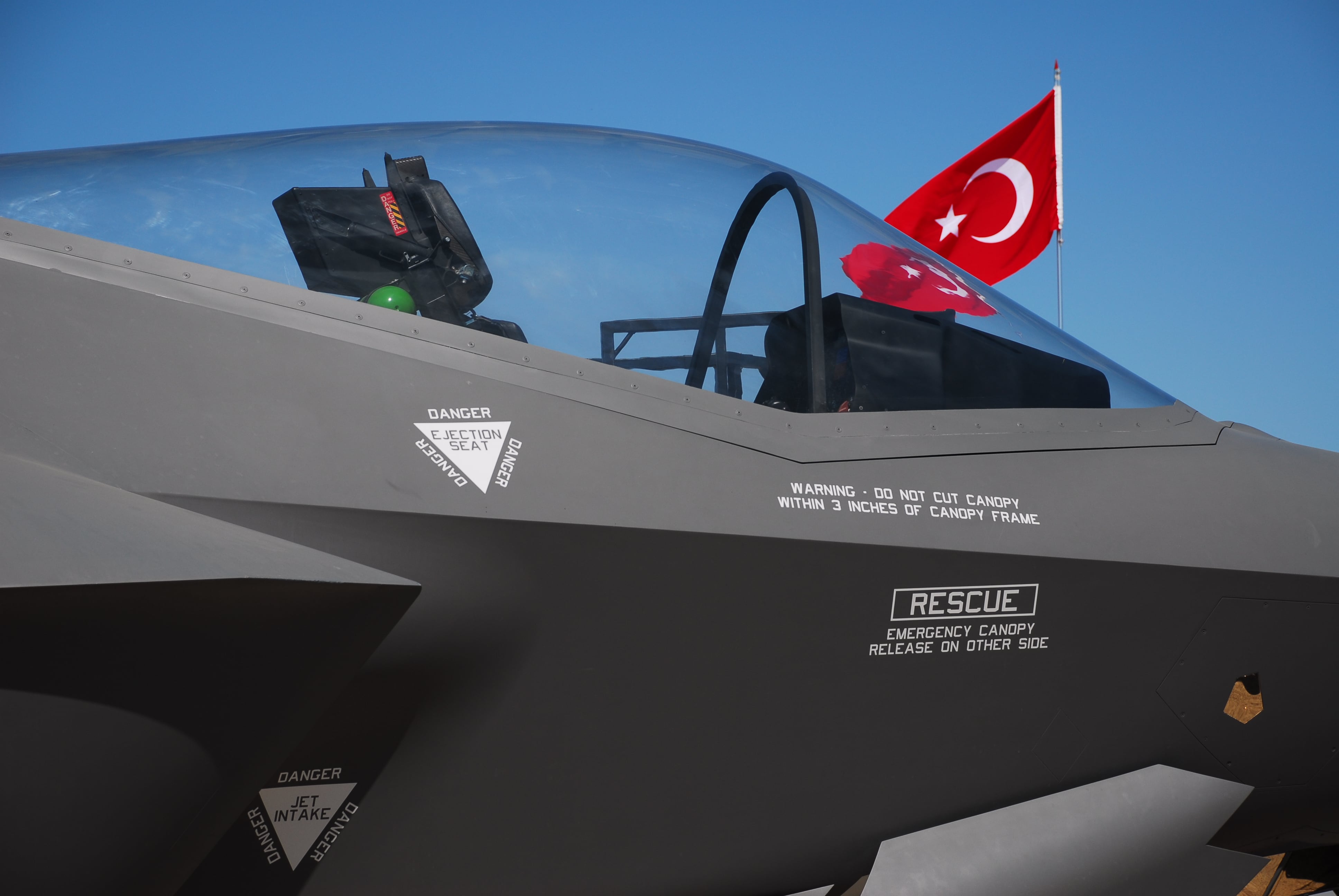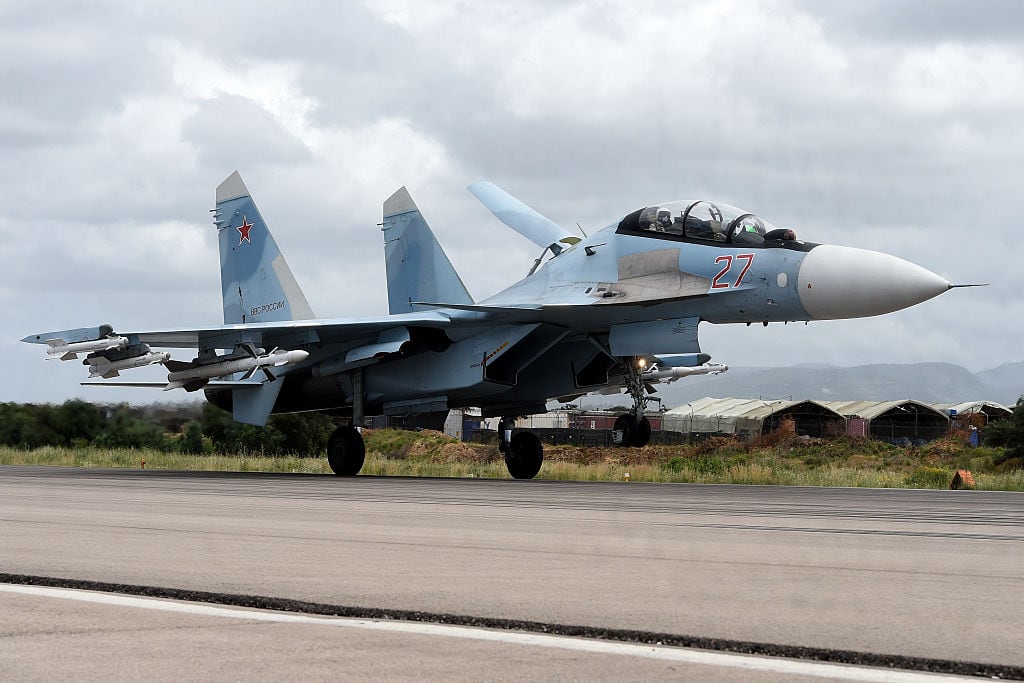OVER THE ATLANTIC OCEAN — The U.S. Air Force’s top general isn’t ready to say that the service’s stealthy F-35s will never fly out of its air base in Turkey, despite an ongoing feud between Washington and Ankara about Turkey’s purchase of a Russian air defense system, he said in an exclusive July 20 interview.
Last week, the United States announced that Turkey is to be expelled from the F-35 program after Russia delivered the first shipment of the S-400, a system that networks together radar, missiles, and command and control designed to find and track enemy aircraft and shoot them down.
But U.S. Air Force Chief of Staff Gen. Dave Goldfein said the service has not imposed restrictions that would prohibit stealth aircraft like the F-35 from operating from Incirlik Air Base, which is a key launching point for U.S. air assets in southern Turkey.
“What I would say is we would do an assessment of the threat; and based on the intelligence assessment of the threat, we would make a decision based on everything in the world when we fly,” he said.
“I don’t want to potentially tie, right now, a blanket operational assessment with a technological assessment,” he said. “ ‘Does this mean you’re never going to fly F-35s in Turkey?’ I can’t commit that because I don’t have an assessment of the threat and where it is in real time. And I’m going to make a decision in real time, as I do every other time.”
U.S. defense officials had warned for more than a year that Turkey would not be allowed to obtain its F-35 jets unless it canceled its plans to buy the S-400. In June, Under Secretary of Defense for Acquisition Ellen Lord stated that Turkish officials involved in the F-35 program — including pilots, maintainers and officials based at the program office in Washington — would be forced to return to Turkey by July 31.
RELATED

But Turkey moved forward with the acquisition, accepting the first shipment of the system on July 11.
“Turkey’s decision to purchase Russian S-400 air defense systems renders its continued involvement with the F-35 impossible,” said a White House statement announcing the decision to cast Turkey from the program. “The F-35 cannot coexist with a Russian intelligence collection platform that will be used to learn about its advanced capabilities.”
Turkey planned to buy 100 F-35As, the conventional-takeoff-and-landing model also flown by the U.S. Air Force and most international F-35 operators.
The Pentagon will pay $500-$600 million in nonrecurring engineering costs to relocate production of certain components from Turkey to other suppliers, Lord said last week. Meanwhile, the department is still grappling with how best to deal with Turkey’s extant F-35s currently used for pilot training at Luke Air Force Base, Arizona, as well as the jets the country has on order.
Goldfein, who spent last week visiting air bases in Europe and attending meetings with foreign air chiefs, said his counterparts were aligned with the U.S. decision to remove Turkey from the program.
“There’s pretty good solidarity among the F-35 users that we’re on the right path. There’s also pretty good solidarity that there’s still hope that we’re going to somehow work our way through this, with Turkey as a valuable ally — that we’ll work to some kind of a solution on the back end of this.”
RELATED

While Goldfein acknowledged that it is “incompatible for, in one country, the F-35 and the S-400 to coexist,” he added that the Air Force needs to retain its operational flexibility and not rule out any options regarding how it may deploy its forces in the future.
“Our military-to-military relationships remain as strong as ever, and we need to keep them as strong as ever as we allow the diplomatic discussion to continue,” he said.
Read the full exchange with Goldfein here:
I know the final decision to push Turkey from the F-35 was a political decision and not your responsibility, but is the U.S. Air Force considering imposing restrictions on the types of aircraft that it would operate from Incirlik?
We’re not, because any kinds of restrictions, that’s completely in the policy lane. Our military-to-military relationships remain as strong as ever, and we need to keep them as strong as ever as we allow the diplomatic discussion to continue.
So right now, for instance at Luke Air Force base, we’re now transitioning Turkish pilots, maintainers and their families out of the program. I’ve talked to my commander a few times just to make sure — these are our teammates, and we treat them with dignity and respect. This is not on them. This is not on their families. And we all know transitioning in a PCS [permanent change of station] move is hard enough. Let’s make sure that we’re treating them like our teammates, trusted teammates. So at the mil-to-mil levels, no change.
Aren’t there technical risks, sensitives or security risks if you were to use the F-35 in an airspace where the S-400 is operated?
Sure. That’s what’s behind the policy. It’s sort of simplistic, but the F-35 is a flying computer. It’s got the computing capacity that you read about and that’s what gives it its fusion technology. The S-400 is a computer, and it’s a rather advanced computer. At the end of the day, you don’t hook up adversarial computers. If you want to boil it down to basics, that’s what this is all about. They are incompatible systems.
But with that in mind, why wouldn’t those conditions cause the U.S. Air Force to declare it will no longer operate or train from Incirlik?
We assess threats globally. We’ve got F-35s you saw at Spangdahlem [Air Base, Germany]. They’re going to Estonia. They’re going to different places. We do an assessment of the threat environment every time we operate; and by the way, we’re pretty good at it. We did it with the F-22 and we did it back when I was flying the F-117.
But none of those countries are using a Russian air defense system.
No, they don’t have to. All they [Russia] have to do is have one on the border or in proximity, right? We fly into an air show with the F-35, the F-22, and we have a pretty good sense of what’s going to be looking at it before it flies up here.
Sure, but that’s different than the Turks potentially having Russians in country to service the S-400 air defense system and also potentially having access to the F-35. So why no restrictions? Do you have concerns about that?
What you just described is why its incompatible for, in one country, the F-35 and the S-400 to coexist. That’s the reason. You don’t hook a computer to an [adversary] computer.
So why not announce restrictions to flight operations at Incirlik?
We don’t have F-35s there. And I wouldn’t announce restrictions because if it’s incompatible, I’m not going to fly there.
So it’s fair to say the U.S. Air Force will not fly F-35s from Incirlik if Turkey continues to acquire the S-400, correct?
I think that’s too bold a statement. What I would say is we would do an assessment of the threat; and based on the intelligence assessment of the threat, we would make a decision based on everything in the world when we fly. And trust me when I tell you that before we were flying the F-35 in the exercises at Spangdahlem, we have a very good sense of exactly where it’s flying, what the threat is, and how and when we operate. Turkey will be no different. I wouldn’t do anything different.
Here’s what I don’t want to do: I don’t want to potentially tie, right now, a blanket operational assessment with a technological assessment. I think you can confuse readers, right? Because they will start conflating: “OK, you made a decision technically about collocating in one country the F-35 and S-400.” And the answer to that is: true.
Now let’s play this out. “Does this mean you’re never going to fly F-35s in Turkey?” I can’t commit that because I don’t have an assessment of the threat and where it is in real time. And I’m going to make a decision in real time, as I do every other time.
So you want to leave the decision space open so that you can operate there in the future if you need to.
Absolutely.
Have any American allies and partners raised concerns about this situation?
What I’ve heard overall is that we’re standing firm together. Part of the message is that this is not just a U.S.-Turkey discussion, this is an F-35 users group discussion because we’ve got to protect this technology not just for the U.S. but for all who invest in the F-35 because we all share the secrets we have to protect.
So there’s pretty good solidarity among the F-35 users that we’re on the right path. There’s also pretty good solidarity that there’s still hope that we’re going to somehow work our way through this, with Turkey as a valuable ally. That we’ll work to some kind of a solution on the back end of this.
Valerie Insinna is Defense News' air warfare reporter. She previously worked the Navy/congressional beats for Defense Daily, which followed almost three years as a staff writer for National Defense Magazine. Prior to that, she worked as an editorial assistant for the Tokyo Shimbun’s Washington bureau.








